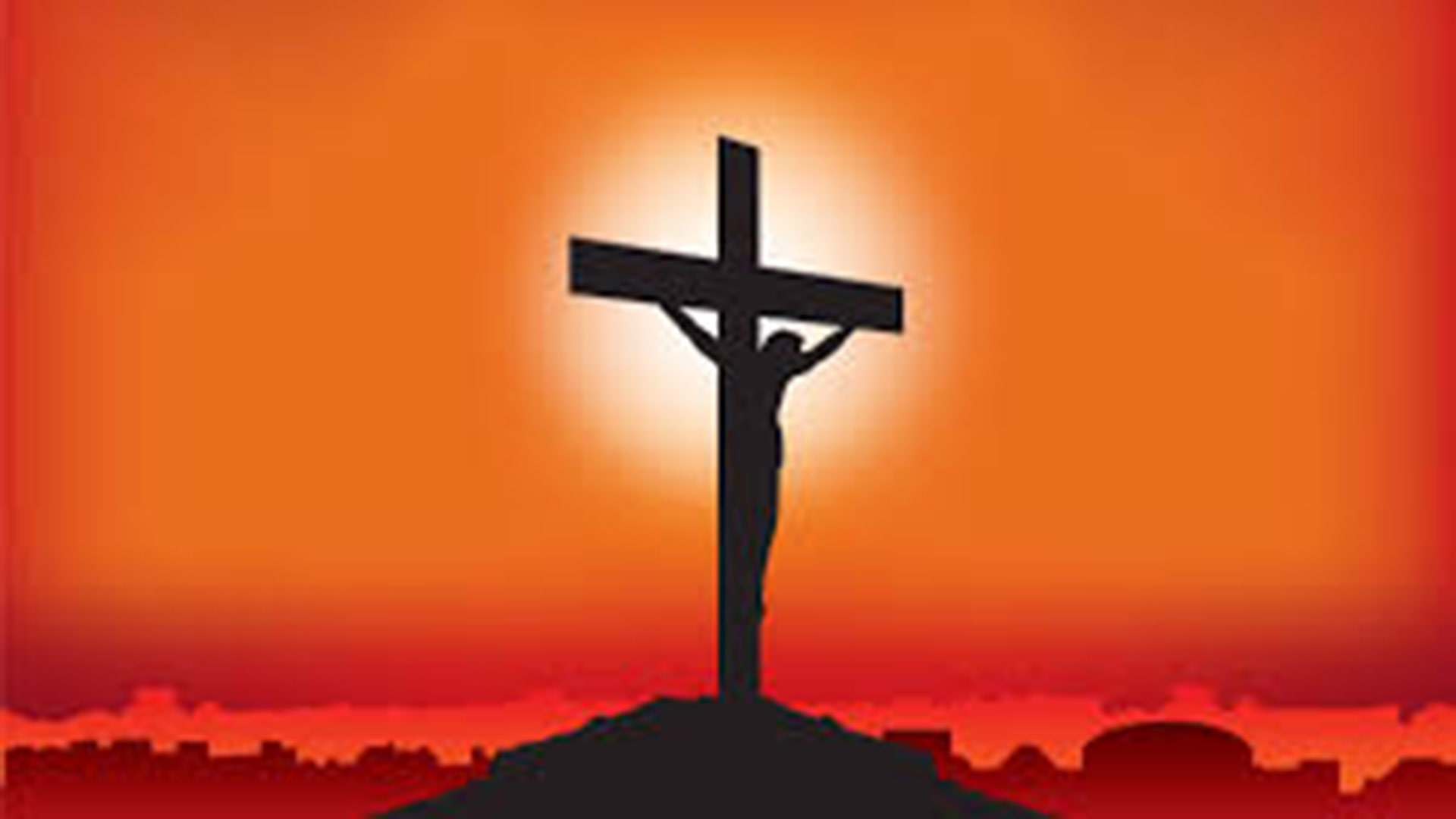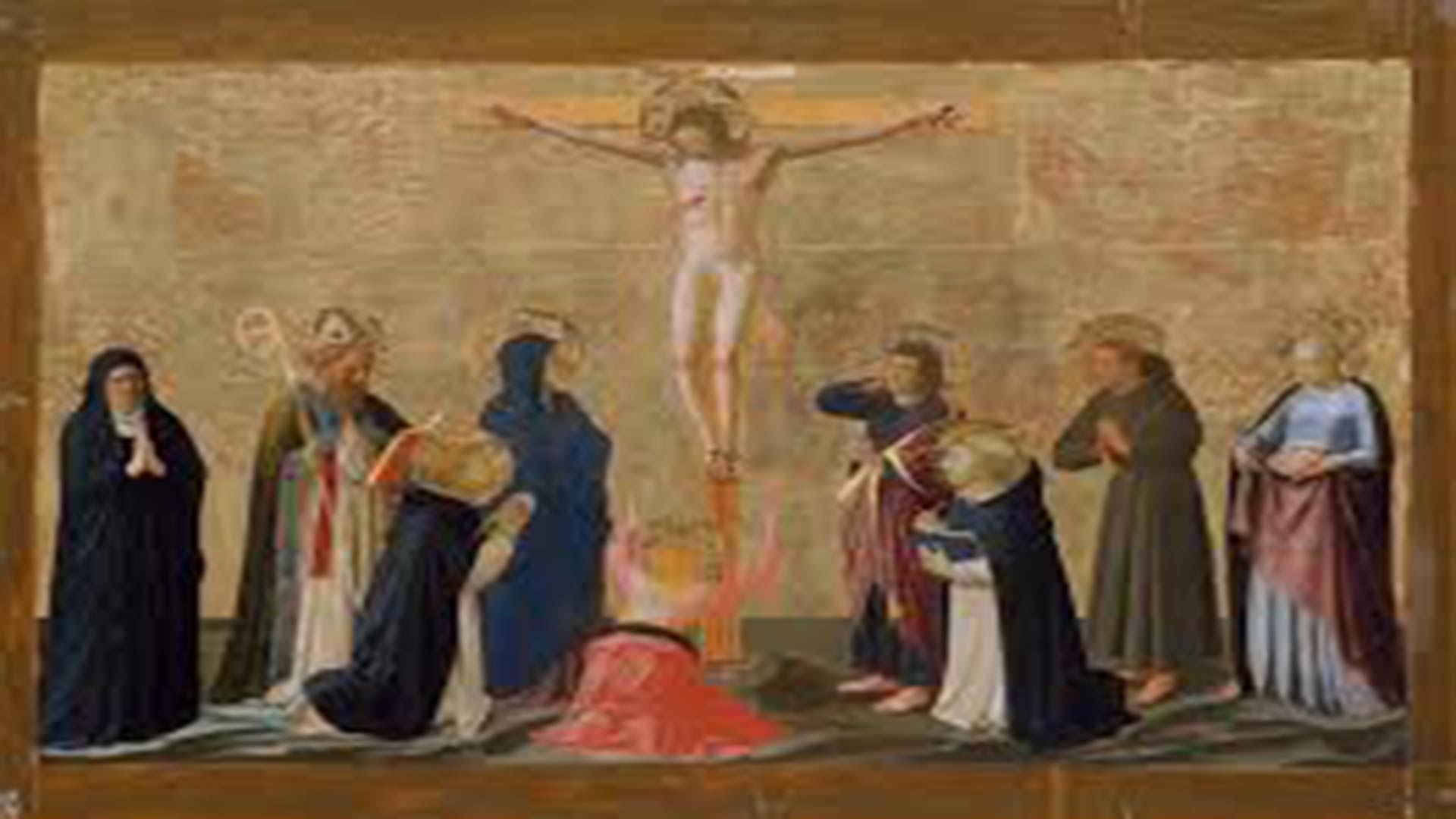Do we need any more signs?
Lent 2020 - Day 8
What is the use of "signs" if, when they appear, we refuse to see them? They say the Jews always looked out for eloquent signs; but, alas, they failed to recognise the Messiah, the greatest Sign of all.
That's true of us as well. We behave like children that fail to see the truth of their parents' utterances. And when we sin we fail to see the goodness of God's plans for us....
Let today be a day of great blessing: may we have the wisdom of the people of Nineveh who, "from the greatest of them all to the least of them," heeded the Word of God made known by Jonah. And let us recognise that "something greater than Solomon is here," and "something greater than Jonah is here" and love Him: Christ our Lord who rose on the third day!
Nothing more reassuring than prayer
Lent 2020 - Day 7
In the first reading today God speaks of the power of His Word: "It shall not return to me empty, but it shall accomplish that which I purpose, and prosper in the thing for which I sent it." The Gospel reminds us of the efficacy of filial prayer. And here I fondly remember my father reassuring me that God knows what we think even if we don't express it, and gives us what we want precisely when we need it: "... your Father knows what you need before you ask Him." I've also believed ever since that Jesus gave us the Our Father just to convince us to not hanker after the "right word".
Change of heart
Lent 2020 - Day 6
The readings of the day give us a glimpse of what it will be when the Son of Man comes in His glory: we will be separated like the wheat from the chaff. Our eternal reward will hinge on whether or not we have loved and put God first in our life on earth by living according to what is honourable in His eyes. Let's then take this day as an invitation to conversion.
Love Him with all your heart
Lent 2020 - Day 4
“God will love you, of course, even though you do not love him, but remember if you give him only half your heart, he can make you only fifty percent happy.” - Fulton Sheen (1895-1979)
Here's yet another author that can keep us company through Lent. Celebrated Archbishop and highly acclaimed radio and TV star, Fulton Sheen's writings and recordings never fail to strike a chord.
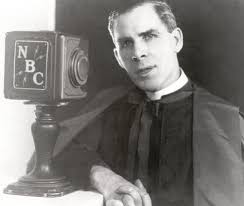
While still a parish priest, Sheen taught theology and philosophy at the Catholic University of America. Starting from 1925, he wrote seventy-three books. In 1930 he began a weekly NBC Sunday night radio broadcast, The Catholic Hour, on which he once referred to Hitler as an “anti-Christ”. In 1946, Time magazine featured him on the cover and referred to “the golden-voiced Msgr. Fulton J. Sheen, U.S. Catholicism's famed proselytizer”, whose radio broadcast received 3,000–6,000 letters weekly from listeners.
In 1940, Sheen celebrated an Easter Sunday Mass in 1940 in one of the first televised religious services. This put in motion a new avenue for his religious pursuits. In 1952, he moved to TV, presenting Life is Worth Living. It comprised unpaid Sheen simply speaking in front of a live audience without a script or cue cards, occasionally using a chalk board. Here he denounced the Soviet regime, saying, "Stalin must one day meet his judgment." The dictator died within a week.
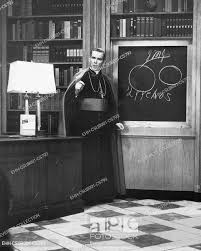
Did Cardinal Spellman drive Sheen off the air when Life is Worth Living was at the height of its popularity? Sheen never talked about the situation; he even praised Spellman in his autobiography titled Treasure in Clay: The Autobiography of Fulton J. Sheen (1980) and made only vague references to his “trials both inside and outside the Church.”
In 1958, Sheen became national director of the Society of the Propagation of the Faith and, eight years later, Bishop of the Diocese of Rochester, New York. From 1961-68, Sheen’s final presenting role was on the syndicated The Fulton Sheen Program. Through his career, Sheen helped convert a number of notable figures to the Catholic faith. Each conversion process took an average of 25 hours of lessons, and reportedly more than 95% of his students in private instruction were baptized.
Just before his retirement, Sheen was appointed archbishop of the titular See of Newport, Wales. Two months before he died, when Pope John Paul II visited St Patrick's Cathedral in New York, he embraced Sheen, saying, "You have written and spoken well of the Lord Jesus Christ. You are a loyal son of the Church.”
 Today, the Fulton J. Sheen Museum in Illinois houses the largest collection of Sheen's personal items and the Sheen Center for Thought & Culture, Manhattan takes his name. In 2009, his shows began rebroadcasts on the EWTN and the Trinity Broadcasting Network’s Church Channel cable networks. Sheen's contribution to televised preaching makes him one of the first televangelists.
Today, the Fulton J. Sheen Museum in Illinois houses the largest collection of Sheen's personal items and the Sheen Center for Thought & Culture, Manhattan takes his name. In 2009, his shows began rebroadcasts on the EWTN and the Trinity Broadcasting Network’s Church Channel cable networks. Sheen's contribution to televised preaching makes him one of the first televangelists.
The cause for Fulton J. Sheen's canonization was officially opened in 2002. He is now Venerable. And venerable is also his large body of writings and talks.
Accepting the Cross
Lent 2020 - Day 3
"Each one of us has a cross to carry. Each one of us would like to be something he is not, to have something he has not, to be able to accomplish something he cannot. We need to let go of being what we are not, having what we have not, and accomplishing what we cannot; this is the way for all of us." - Plínio Corrêa de Oliveira (1908-1995), in 'Reflections on the Passion of Our Lord Jesus Christ' (https://www.tfp.org/lenten-reflections/)
In touch with the Society for the Defence of Tradition, Family and Property (TFP) for a decade (1989-1999), its Founder's spirituality came easily to mind in my quest for Lenten reading. Here are a few notes on the man whose life can't fail to touch a committed Christian:
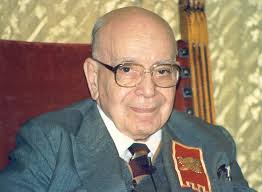
Plínio Corrêa de Oliveira was a Brazilian intellectual and Catholic activist. At 24 he became the youngest congressman in Brazil's history and a leader of the Catholic bloc. Valuing his Catholic faith above all else, he turned his back on a political career and served the Church. He taught Modern and Contemporary History at the Pontifical Catholic University of São Paulo and was editor of the Catholic weekly Legionário. In 1951, he founded the magazine O Catolicismo and later was a columnist for Folha de S. Paulo, the city’s largest daily.
Dr Plínio (as he was fondly known) was an avowed Thomist, his political ideology anti-Communist. To counter the school of liberation theology and the Cuban revolution, he founded the TFP in 1960. He decried the reforms of the Second Vatican Council but remained devoted to the Chair of St Peter.

Dr Plínio is the celebrated author of fifteen books and over 2,500 essays and articles. Some of his works are: In Defence of Catholic Action (1943); Revolution and Counter-Revolution (1959), a seminal treatise that inspired the founding of autonomous TFP groups in several countries worldwide; The Church and the Communist State: The Impossible Coexistence; and Nobility and Analogous Traditional Elites in the Allocutions of Pius XII, his swan-song.
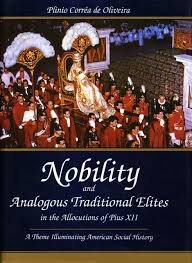
Dr Plínio's writings have the mark of an intense interior life. He had deep confidence in the Blessed Virgin Mary. An unparalleled twentieth-century crusader for a Christian Civilization, and the final victory of good over evil, he believed in the words of Our Lady at Fatima: “Finally my Immaculate Heart will triumph!”
After Dr Plínio's death, there was a split in the TFP. Eight co-founders took charge of the organization while a large chunk led by Mgr. João Clá Scognamiglio Dias left to set up Heralds of the Gospel. The new group, open to the reforms of the Second Vatican Council, was recognized as an International Association of Pontifical Right, the first one established by the Holy See in the third millennium. They are now present in 78 countries.
Mgr. Dias eventually got back control of the TPF, now devoid of its former glory. Meanwhile, the original co-founders of the TFP set up Instituto Plínio Corrêa de Oliveira (IPCO) to carry on the Founder’s ideology and activity. IPCO is associated with the TFPs and similar organizations worldwide, like the TFP was before their division.
In 1989, the TFP paid tribute to their Founder in a book titled O Homem, Uma Obra, Uma Gesta. Dr Plínio has many other biographies, two main ones being The Crusader of the Twentieth Century, by Roberto de Mattei (1998) and Rencontre avec Plínio Corrêa de Oliveira - Défenseur de la Chrétienté, by Mathias Von Gersdorff (2019). Earlier, regretting the absence of an autobiography, IPCO published Minha Vida Pública (2015), an anthology of writings that throw light on the life and mission of the man.
Knowing Dr Plínio Corrêa de Oliveira’s ideals fills a Christian with hope. His profound analysis of history and world events and his supernatural approach to life - a loving acceptance of the Cross - can uplift the most disheartened soul. To me, a decade with Dr Plínio was worth a lifetime.
Heralds of the Gospel, https://www.arautos.org/
IPCO, https://www.pliniocorreadeoliveira.info/biografia.asp)
The Springtime of Lent
Lent 2020 - Day 1
On the look-out for inspirational authors to read this Lent, I first thought of the old classics. But then I chanced upon a twentieth-century author: Therese Mueller, born in Germany, in 1905. An academic (economics and sociology) married to sociologist Franz Mueller, they were liturgical pioneers and involved in the Catholic youth movements in their country.
In 1940, the arrival of the Nazi regime interrupted their lives. The Mueller family migrated to the United States where people got interested in their faith experiences in Europe. Therese, with her sociological background, got vocal on how the liturgy could be taught and shared amidst a family. Her articles were compiled into a pamphlet titled Family Life in Christ (1941). Later she wrote Our Children’s Year of Grace (1943) and The Christian Home and Art (1950). These publications are an expression of her experiences as a wife and mother.
The Muellers eventually settled in St. Paul, Minnesota. Franz lectured at St Thomas University, while Therese taught part-time at St Thomas and at the College of St Catherine. The couple wrote and spoke about the Christian home as a crucial dimension for the liturgical life. Franz died in 1994 and Therese in 2002, leaving behind an eloquent life example of lay priesthood.

Here's an excerpt from Therese Mueller's Our Children’s Year of Grace (recently reprinted by Martino Fine Books, ISBN-13: 9781684222445), aptly describing the fruits of the springtime of Lent:
"We prepare for the renewal of our baptism, we suffer with Christ for our sins, we are buried with Him so that we may also arise with Him to a new life of grace and glory."
Latter-day Lessons from Lent
A very important person who passed away recently is reported to have reflected profoundly on life and death, on his sick bed. Some others dismiss the story as a sham. At any rate, as the Italians say, si non è vero, è bene trovato – even if it’s not true, it’s well said. Reflections on the mystery of life and death hold important lessons for the human soul.
As Christians, we should be concerned about the life we lead, for upon that will depend our fate in the afterlife. It’s futile even for a churchman to bend over backwards to “save” a departed soul whose fate is practically sealed; and no amount of adulation can change their post-history. It is equally absurd to try and “modify” the image they’d carved for themselves. In short, it’s easier for a camel to pass through the eye of the needle than for history to be rewritten convincingly and abidingly by PR men. Truth always prevails.
Lent is an apt time to reflect on our personal history and on meta-history. The season reminds us that we are dust and to dust we will return; it points to our impermanence and to the limited time at our command. But, alas, as Helen Keller notes, “Most of us, however, take life for granted. We know that one day we must die, but usually we picture that day as far in the future. When we are in buoyant health, death is all but unimaginable. We seldom think of it. The days stretch out in an endless vista. So we go about our petty tasks, hardly aware of our listless attitude toward life.”
It is undeniable that each day brings us closer to death; then, why not prepare for it while it’s time! There should be no regrets when the hour strikes. Étienne de Grellet says very evocatively: “I shall pass this way but once; any good that I can do or any kindness I can show to any human being, let me do it now. Let me not defer nor neglect it, for I shall not pass this way again.” Truly, if we have lived with loving kindness, at the end of our earthly journey we will not fret about how history will remember us. In the memorable words of King Dom Pedro of Brazil, we will die in peace, “serenely awaiting the justice of God in the voice of history”.
But isn’t all this easier said than done? Yes; as frail human beings, we’re prone to fail. Hence, the accent should be on mending our ways and getting back on track. On the very first day of Lent, the Holy Scripture counsels us: “Rend your hearts and not your garments” (Joel 2:12). It’s a clear invitation to look inside ourselves and pluck out the evil lurking there. A time-tested prescription for a change of heart is prayer, fasting and alms-giving, provided we don’t practise our piety before fellow humans in order to be seen by them; or look dismal when we fast, like the hypocrites do; and, when giving alms, don’t proclaim it from the rooftops.
But that’s not all. In our Information Age, we might well summon up another pertinent Biblical prescription: “Let what you say be ‘yes, yes’ or ‘no, no’” (Matt. 5:37) This Biblical instruction rounds it up for our social media-savvy generation for whom praying, fasting and giving alms may not be an issue at all but taking a position may feel politically incorrect. For instance, a Christian who has the impudence to refer to the sufferings of a politico, a mere mortal, on a par with those of Christ may well have betrayed Christ for thirty pieces of silver.
Steve Jobs, the man who hyped the Apple bite in the digital age, is also credited with a soulful quote recorded in his last days. He is said to have dubbed the modern, consumerist individual a “twisted being”. This is nothing new; it comes across as a newfound truth only because a latter-day ‘saint’ uttered it. The more important point to take in is that we shouldn’t leave plain truths such as these to startle us at the eleventh hour, when all along we’d learnt that our real treasure lies in Heaven.
We Christians who have gone through Lent year after year should have known better. Our catechesis should have set us thinking not only about life but about the afterlife as well. All things considered, Death lets us appreciate the meaning and purpose of Life – and this is perhaps one of the most important lessons we can draw from Lent.
First published in Renovação, 1-15 April 2019
and in The Stella Maris Bulletin, Lent 2019
Lent, an irresistible balm for the soul
Haven’t we felt listless, not to say ill at ease, about Lent, sometime in our life? As a child, I tagged along with my parents to liturgical services that made little sense. Not surprisingly, on reaching the age of reason, I had to be cajoled into attending them. Then, suddenly, I got a break. I found motets, songs for the season, composed by Goa’s unnamed musicians of old, to be an absolute feast for the ears, alongside similar compositions by Bach, Palestrina and Mozart. I also discovered, quite ironically, that the Via Dolorosa in the balmy evening breeze and to the chirping of birds in the woods of Altinho was not so dolorous after all!
Much as I delighted in those two little secrets, at one point I felt an interior dryness, a sense of futility, as though I were trudging a wasteland. The saving grace came from my grandmother’s exemplary life, which was far better than precept. Likewise, my parents’ quiet commitment to the Faith, amidst their daily toil and moil, provided important insights into the valley of tears we live in. And Scripture wrapped it up so beautifully: “Look at the birds of the air: they neither sow nor reap nor gather into barns, and yet your heavenly Father feeds them. Are you not of more value than they?” (Mt. 6: 26)
Clearly, the rituals that I had cheekily dismissed yesterday changed into victuals for the spirit today. And as another season of Lent comes round, I know just how it will turn out, how they will sustain me…. Beginning Ash Wednesday, I will go to church more often than usual, for Mass and Stations of the Cross. On a hopefully bright and festive Palm Sunday morning, I will feel cheery. Yet, by evening, my mood will change hugely – as it always did when I witnessed the spectacle of the full-size statue of the Suffering Lord emerge from the immaculately white church of the zigzag stairway, to join the faithful clad in dark shades, in a penitential procession through the streets of the capital.
What a poignant start to the Holy Week! It’s the last lap of an all-embracing spiritual journey. You’ll probably catch me shaking off distractions on holy Monday, Tuesday and Wednesday. Through the rest of the week, I will be all eyes and ears to the Mystery of mysteries replayed in the Paschal Triduum, from the moment of that bittersweet Last Supper on Maundy Thursday through excruciating Good Friday and triumphant Easter Sunday. Soon, the week’s darkness will give way to light and its drabness will translate into loud proclamations. The faithful will be beside themselves, singing in an unending refrain: “No one can give to me that peace that my Risen Lord, my Risen King can give.”
It pays to be fools for Christ; Chesterton’s “Donkey” is proof that there will be no regrets. The thought of self-privation, which had bugged me when young, doesn’t assail me. I find it easier now to give up a favourite food or a much-loved pastime. Penance and sacrifice, besides fostering self-discipline and tempering our desires, are game-changers. They help to boost one’s spiritual life and improve our physical health. We are led to find ways and means to step up our knowledge of our faith; perform acts of kindness and mercy, wherever we may be; pray for others, and clean ourselves inside out by means of a holy confession. Before long, we learn to slow down, while the rest of the world is in a rat race, enjoying in a fool’s paradise.
It is reassuring to think of Lent as pilgrimage toward the profound mystery of the passion, death and resurrection of Jesus Christ. Benedict XVI says it is also “a privileged time of interior pilgrimage toward Him who is the fount of mercy. It is a pilgrimage in which He himself accompanies us through the desert of our poverty, sustaining us on our way toward the intense joy of Easter.” How, then, can we be listless or ill at ease at Lent when an irresistible balm for our soul is at hand?
(First published in The Times of India, Panjim, 1 March 2017)
From Crown to Crown
All things considered, Earth and Eternity are the ultimate realities we encounter; one is perishable, the other is everlasting. There is also a kind of bridge linking the two: how successful we are in crossing it would depend on how well we have walked our pilgrim way!
That there are no gains without pains, or that nothing comes for free, is a lesson we imbibe early in life. As aspirants to success (which means different things to different people), all of us take that saying seriously, lest we miss out on something special or precious. And that’s precisely what sets off the rat race we are accustomed to seeing in our day and age; and that’s what is behind our running from pillar to post in a desperate bid to make even the impossible possible in our lives. We seldom realize that frenziedly going out to secure a few pearls we could risk the loss of a fortune — for example, love in the family or peace in society!
Even if we aspire legitimately “to leave behind us footprints on the sands of time”, as Longfellow put it, it is important to have great souls as models to help make our lives sublime. As for us, we are fortunate to have in Our Lord Jesus Christ a model par excellence: not only does He teach us how to negotiate the twists and turns of our earthly existence but also points the way to our eternal destination. So if He be the lighthouse, no ship can go under.
Truly, the gains we seek in the world are but vanity of vanities. Hence, omnia vanitas — all is vanity — in the Book of Ecclesiastes is a pointed reference to the ultimate uselessness of the human effort; it is a direct opposite of what our Divine Master came into the world for and did: emptied Himself for our sake and unto death. This extreme sacrifice of love may not be our cup of tea — ordinary creatures like us believe we are here to live! But, surely, at least a pale imitation of that sacrifice is not only possible but also highly desirable.
A mother who sacrifices a night’s sleep for her child laid up in bed and the physician who has walked the extra mile to see that that child recovers quickly have both done their bit to partake of Calvary. An earnest desire on our part to put up with the dark nights of our souls and to make that ascent to Mount Carmel is an exercise always pleasing to our Father in Heaven. Paradoxical though it may seem, it is in dying to our selves — to our sins — that we live better lives! And if in business they believe that a ‘you attitude’ helps business grow, how much more should we as Christians think of a ‘You, Lord’ attitude so that we may grow in favour with the Only One that finally matters! This can send us several notches up the ladder of love and have peace spring in us.
This Lent, then, let us ask the Lord to increase our faith, our hope, our charity…. For our part, let us try to transform our own little crowns of thorns into crowns of patience, resignation and forgiveness. Let us ask God to grant us a spirit of detachment from worldly things; the gift of understanding the predicament of the less fortunate; a feeling of compassion towards all and sundry, and a dose of cheer even while in the thick of trials.
Come Easter, let us convert our sorrows into joys. If we don’t we will have only ourselves to blame. After all, wasn’t Our Lord’s Cross the biggest of them all... and for no fault of His! Let us straighten our paths for, if we don't, the crown of thorns will be here to stay.
Finally, let us be quick to realise how truly glorious it will be if — in the manner of Our Lord — after having worn the crown of thorns and clung to the old rugged Cross, we can exchange it some day for the resplendent crown awaiting us on the other side of that bridge.
(Editorial, The Stella Maris Bulletin, Vol. VI, No. 4, Mar-May 2013. Reprinted in Renovação, Vol. LI, No. 5, 1-15 Mar 2013)
Crucifying the King, in Meta-history
In the last few weeks the world witnessed momentous political changes after several national governments went crumbling like packs of cards. In some of those countries legitimate monarchies were overthrown and in others self-styled royals were summarily ousted.
There is a sense of déjà vu in those events. They are child’s play if we consider that two thousand years ago the Man who was God was crucified by his countrymen. The Creator of the Universe was destroyed, the Giver of Life put to death. The King of Kings who had deigned to visit his people was unceremoniously eliminated from the face of the earth.
In contrast with worldly kings, who generally collapse under the weight of their own misdeeds, Our Lord Jesus Christ was executed without good reason, or rather, because he was righteous. There were no prolonged hearings, no intention to ascertain the truth, no mercy…. There was only injustice, lies, brutality, ingratitude…. The annihilation of Our Lord was without a doubt the greatest crime ever perpetrated in history, and shall remain so to the end of times.
It was also one earth-shattering event that the Chosen Race became answerable for; it was an irreversible act that the followers of Christ have had to painfully endure ever since. No doubt it caused the Church to have a mental block against the Jewish people, who themselves held one against the Egyptians; but, thankfully, the bitterness was not of catastrophic proportions. Neither did the Church regard the Gospels as a basis for anti-Judaism nor did individual Christians persecute the Jews. Yet, the head of the World Jewish Congress, Ronald Lauder, read insidiously into it all, when, as perpetrators of the crime, it was for the Jews to apologize to the Christians, and not the other way around.
Well, this can be debated till the end of times; the undeniable fact is that neither side was proactive in dissipating ill feelings. It is not for us here to recount the long story of that failed relationship; but it is pertinent to note that Pope Pius XII made personal and official efforts to mitigate anti-Semitism in Germany, or what Churchill dubbed “a monstrous tyranny, never surpassed in the dark, lamentable catalogue of human crime.” In 1964, Vatican Council II for the first time issued a document, Nostra Aetate (‘In Our Times’), repudiating the notion of collective Jewish guilt for Jesus Christ’s death. And recently, in his second volume of Jesus of Nazareth, Pope Benedict XVI ascribed that guilt not to “the Jewish people as a whole” but to the “aristocracy of the temple” and the “masses” who had acclaimed Barrabas, and whose cries were endorsed by their Roman rulers.
Thus, the Catholic Church, albeit the aggrieved party, moved on beyond individuals and races, to reflect on what was indeed a watershed in the history of humankind! The superhuman magnitude of the crucifixion and death of Iesvs Nazarenvs Rex Ivdaeorvm made it an event infinitely more critical than the fall of the most magnificent of the world’s emperors! In Jesus’ death humanity had a flashback of history: Eden became Gethsemani and Satan, Judas. But the dark clouds of Good Friday had a silver lining to them: Whereas at Eden death had stuck into the Tree of Life, at Calvary life sprang up at the Tree of Death. It was God unmistakably reaffirming His supremacy over Creation – a tying up of loose ends in meta-history.
While we have an occasion to relive this saga, year after year, through the sorrowful spectacle of Lent and the glorious phenomenon of Easter, an honest introspection would quickly show that we need no distant scapegoats for the death of Jesus: As a human race we ourselves are those proverbial Jews and Romans transposed to the twenty-first century. Human nature has run for aeons, connecting thousands of generations through good and evil, so we can’t ever claim that we would have been any different as contemporaries of Jesus. We often reject the Message and the Messenger; we crucify Him every single day of our lives.
It is therefore important for us to turn a new leaf by repenting for our faults. Adam and Eve’s was a felix culpa, which won us so great and so good a Redeemer; but I’m afraid our faults don’t qualify in the same way, so we shall have to always say Nostra culpa, nostra culpa, nostra maxima culpa. And if we wish to fully partake of God’s salvation plan, there is no better way than to embrace the Cross – to make the way of the Cross our way of life – which is not to invite but only quietly accept the myriad forms of suffering through the ups-and-downs of our daily life. It will give us at least a pale sense of the Crucifixion and an occasion to atone for our maxima culpa in our own little way.
No defeated king ever returned to his pristine splendour. Only Our Lord did! If we keep the faith, we too will have a share in the glory that was His on the third day and will be so for ever more.
(Renovação, Vol. XL, No. 8, 16-30 April 2011)



